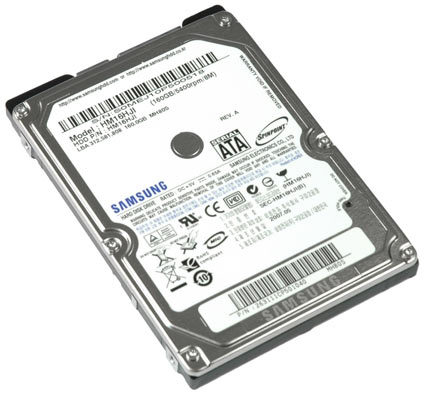Should You Care About Hybrid Hard Drives?
Can Hybrid Hard Drives Change The HDD World?
Although more and more storage manufacturers have announced Flash-based hard drive products for the 2.5" and 1.8" form factors, the Flash-only non-volatile hard drive still remains an exclusive high-end product due to its high cost per gigabyte. At the present time, you can spend $300 either on a 750 GB 3.5" desktop hard drive, or on a 16-32 GB Flash HDD. But there is an interim solution called the hybrid hard drive (H-HDD), which pairs a conventional hard drive with an additional, non-volatile Flash memory to store frequently used data. Microsoft and drive manufacturers such as Samsung promise better battery runtime for notebooks, performance enhancements and increased reliability when using these drives.
We had to wait many months to actually get one of these into our storage test lab, but we finally received our first one: the Samsung SpinPoint MH80. It resembles the SpinPoint M80, which we reviewed here, but the MH80 has an additional 256 MB of non-volatile (NV) Flash memory. This NV cache is supposed to go to work where conventional hard drives fail: the Flash memory doesn't suffer from a mechanical hard drive's long access time, and it is robust and it consumes less energy than a drive's spindle motor. The concept of H-HDDs allows OEMs to pin specific, frequently used application data on the NV cache for quicker access, and to turn the NV cache into a temporary read/write buffer and application cache, so the drive spindle motor can be stopped to reduce energy consumption during idle times.
The concept of H-HDDs primarily applies to notebook hard drives for two main reasons. First, these are much slower than desktop hard drives and hence could use any performance boost; second, energy consumption and ruggedness are more essential issues for mobile users.
It took a few years to implement H-HDDs, as Flash memory storage densities had to reach affordable price points, and it took a while to finalize wear-leveling algorithms as well: remember that the life span of Flash cells is still somewhat limited. Finally, operating system support is required, which forces you to use Windows Vista.
Let's see what the new H-HDDs can do!
Join our discussion on this topic
Get Tom's Hardware's best news and in-depth reviews, straight to your inbox.
Current page: Can Hybrid Hard Drives Change The HDD World?
Next Page Hybrid Hard Drives (H-HDD) And Vista ReadyDrive
Patrick Schmid was the editor-in-chief for Tom's Hardware from 2005 to 2006. He wrote numerous articles on a wide range of hardware topics, including storage, CPUs, and system builds.
-
dmoz > but I would not pay any premium today to get an H-HDD today.Reply
Department of Redundancies Department, how can I help you?
